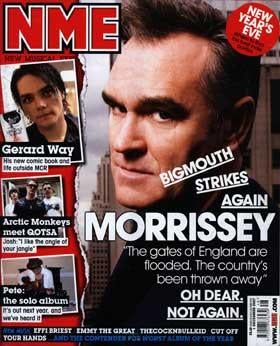
On 30 November Morrissey issued a writ against NME and its editor Conor McNicholas because, he claimed, they had deliberately tried to characterise him as a racist in their report of an interview he gave to journalist Tim Jonze ‘in order to boost their dwindling circulation”.
Published under the heading ‘Has the world changed or has he changed?’the article claimed it set out to discuss why Morrissey, after so many years, still mattered
‘so much to so many people’and to find out how the ‘notoriously reclusive’48-year-old ‘is coping in this era of musical, social and cultural revolution”.
Referring to the fact that NME had last ‘sat down properly’with Morrissey 18 months ago, it said that ‘the time was right to hear Morrissey’s take on the modern age”.
The bulk of the article, however, consisted of what appeared to be a question-and-answer session taken from what the editorial described as ‘a jarring moment towards the end when he steers the conversation onto a topic we never thought we’d find ourselves discussing with him again: immigration”.
The article concluded by comparing Morrissey’s answers to ‘the ravings of a rogue Tory MP’and maintaining that Morrissey’s comments cut directly across the spirit of unity that NME was trying to promote with its Love Music Hate Racism campaign. It finished ‘he might once have been the voice of a generation, but given his comments… he’s certainly not speaking for us now”.
Morrissey has claimed that his comments were ‘butchered, redesigned, reordered, chopped, snipped and split in order to make me seem racist and unreasonable”.
Meanwhile, Tim Jonze, credited with ‘interviewing’but not by-lined on the feature, has claimed on the Guardian website Comment is Free that ‘every single quote attributed to Morrissey is 100 per cent correct, there was no provocation at all, and Morrissey was given a chance to apologise or clarify his views with a second telephone interview.
Jonze claimed that the piece was very critical and NME had decided to tone it down, something he did not agree with. ‘None had any of my points or arguments in them, and none of them were written in my voice… for these reasons, the by-line was removed”. No tapes of the interview appear to have been released.
Consent is a classic defence to a claim in defamation. If an interviewee makes derogatory statements about themselves, the interviewer is entitled to publish these. So does Morrissey have a claim?
The defence of consent by implication refers to informed consent. It would not be a defence to a claim in defamation to show that the answer to a question had been reported accurately, if the question to which that answer was given was fundamentally different to the one published.
An allegation that someone is a racist is undoubtedly defamatory. In determining whether Morrissey has a good claim it will be necessary to discover, as a question of fact, whether his claim that his answers have been edited to make him seem racist and unreasonable is true.
This gives rise to two possibilities: the first, as Morrissey suggests, that his answers have been so distorted to give a different ‘spin’entirely on his responses; the second, that the questions put to him and his answers have simply been subject to the usual editing process that would not change in any substantive way the meaning of what he said in the minds of a reasonable reader.
It would not, for example, mean something defamatory merely to exclude the usual pauses and asides in an interview if by so doing the flow of the conversation is not changed.
Assuming that the editing process did not substantively change the questions and answers, it will then be necessary to see whether, on the basis of the answers given, NME can fairly describe Morrissey’s opinions and responses as ‘racist”: can it defend the conclusion to the interview on the basis it is fair comment?
Fair comment does not need to be an opinion shared by the majority of the writer’s audience, but it does need to be the writer’s honest opinion based on true facts, made without malice – and malice in this context can mean any improper motive, including a desire to boost circulation figures.
Although there is no requirement to tape record interviews, it is common practice for journalists to do so. Tapes can be checked to see if they have been doctored: if such tapes do exist then one would expect it would be a relatively simple matter to check whether or not Morrissey’s claims are correct.
Whether or not the opinions he expresses would then reasonably be regarded as racist or whether, as he claims, McNicholas has used the interview to ‘misstate, misreport, misquote, misinterpret, falsify and excite the bloodthirsty’can then be judged.
Email pged@pressgazette.co.uk to point out mistakes, provide story tips or send in a letter for publication on our "Letters Page" blog
